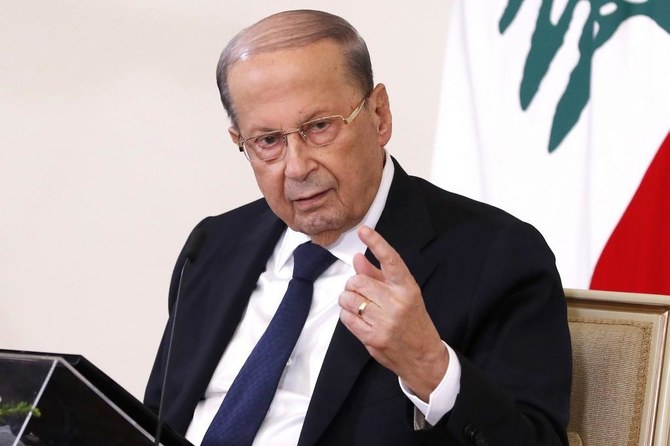BEIRUT: Following the sanctions that hit Lebanese lawmaker Gebran Bassil, President Michel Aoun has called for proof of the accusations against his son-in-law.
Aoun called on the Minister of Foreign Affairs in the caretaker government of Charbel Wehbe to make calls to the US Embassy in Lebanon and the Lebanese Embassy in Washington to obtain the documents and evidence that led the US Treasury to accuse Bassil of corruption and impose sanctions against him.
Aoun said the documents must be referred to the Lebanese judiciary to take the necessary measures in the event the accusations turned out to be true.
Leader of the Free Patriotic Movement (FPM) and the president’s son-in-law, Bassil is the first Lebanese politician to be subjected to sanctions under the Magnitsky Act — designed to punish corruption and human rights violations.
The sanctions include seizing the properties and funds of targeted people and those who deal with them (companies, entities and individuals), closing their bank accounts as well as their family members’ accounts, and banning them from entering the US.
Economist Violette Balaa told Arab News: “Bassil will not be the only one. According to my sources at the US administration, a new list will be issued in one or two weeks with names of other top politicians.”
Balaa added: “The sources confirmed that the list will include officials from the FPM, the Future Movement and the Amal Amovement, as well as businessmen, and will be issued by the US Treasury before the new president takes office. The timing was carefully chosen.”
US Treasury Secretary Steven Mnuchin said in a statement: “The systemic corruption in Lebanon’s political system exemplified by Bassil has helped to erode the foundation of an effective government that serves the Lebanese people. Lebanon has long suffered from corruption and economic mismanagement by power brokers who advance their own interests at the expense of the Lebanese people they are supposed to represent.”
Public opinion in Lebanon was divided on the sanctions against Bassil. Activists in the civil movement in Lebanon voiced their support on social media for any sanctions imposed on corrupt officials, while FPM supporters insisted that Bassil was only sanctioned for rejecting US deals to distance himself from Hezbollah and settle Syrian refugees.
The FPM issued a statement on Saturday where it expressed its “total rejection of the sanctions” and called on its supporters, “who are staging spontaneous protests,” not to go anywhere near the US Embassy in Awkar.
The statement called the sanctions “a blatant slander and clear attempt to use the American law to seek revenge from a political leader for refusing to do something that goes against his national convictions, principles, choices.”
The statement stressed that the FPM “will remain free and will not obey any local or foreign instructions, choosing the national unity over satisfying the foreign authorities and standing by any Lebanese national against any attack.”
Deputy Speaker Elie Ferzli claimed that Aoun and Bassil knew about the sanctions two weeks before their announcement.
“If the parties concerned had formed a Lebanese government after naming Hariri, this may have helped with canceling these sanctions. But it did not happen,” he said.
Former minister Ghassan Hasbani said: “The sanctions under the Magnitsky Act will not be lifted, as it is a law related to misusing authority and influence and corruption” and doubted that “anyone from the Lebanese Forces Party will be subjected to these sanctions.”
Kataeb’s Deputy President Salim Al-Sayegh said that “a good response to these sanctions would be forming a government of independent technocrats, holding early elections, implementing economic reforms and declaring neutrality.”
As soon as the sanctions against Bassil were announced, Hezbollah declared solidarity with its ally and condemned the decision of the US Treasury, considering it “a purely political decision and a blatant and gross interference in Lebanon’s internal affairs, aiming to force a large Lebanese political team to submit to the US conditions and dictates on Lebanon.”
Former MP Fares Souaid said Bassil “is paying the price for the political choice he made in 2006, by becoming a Hezbollah ally.”
“Bassil has turned from a politician into a mail box between Iran and the US,” he added.














